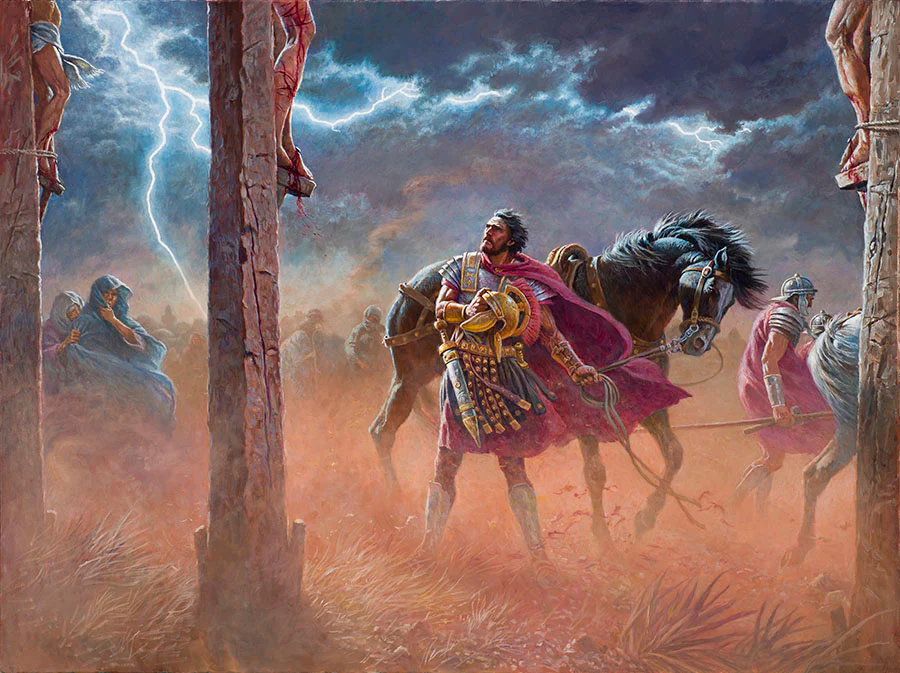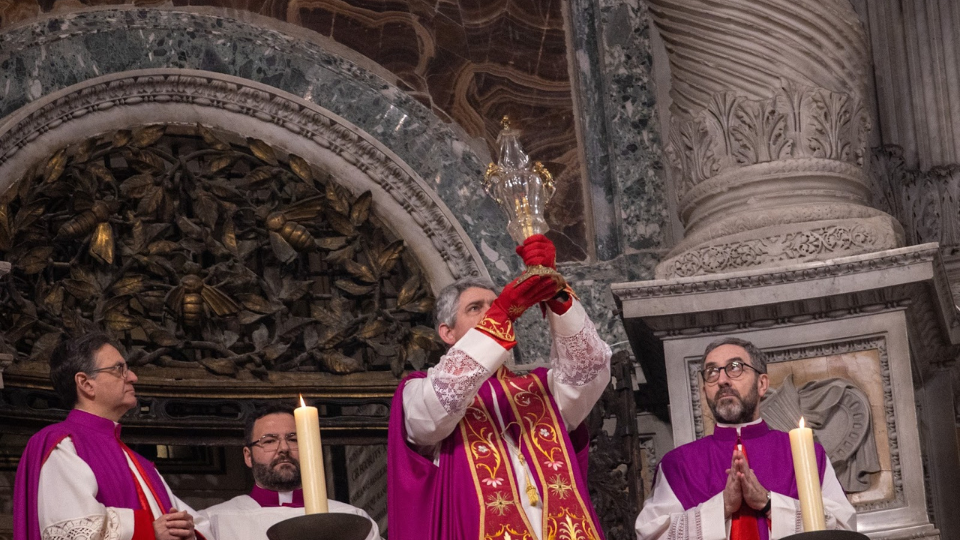
“Truly, this man was the son of God.” Painting by Clark Kelly Price: Used with permission.
Who is this god?
The centurion had watched the spectacle of Pilate and Jesus in the praetorium since early morning. He despised these Jews and their wretched relgious gymnastics. And had hated every interminable moment of his three-year assignment in this eerily beautiful city, Jerusalem. The centurion had trained for war, not babysitting.
But he’d heard and seen things happen around Jesus– things defying explanation. Like the story of Lazarus rising from the dead in Bethany. He’d not been there but men he trusted had. The three soldiers came back to the quarters that night and could speak of nothing else.
Also, last year, the centurion had been returning from an uprising in the north to Jerusalem with his soldiers. They stopped at Jericho to allow Jesus, who had left Jerusalem and was followed by the throng that always accompanied him, pass by. They heard the blind man begging. Everyone knew him, Bartimaeus, for he was always there, by the ruined gates, begging. When the blind man shouted, “Son of David, have pity on me!” Several of the people surrounding Jesus tried to quiet him. But Bartimaeus just shouted again, louder, “Son of David, have pity on me!”
And then Jesus stopped. And said, “Call him.”
Obviously incredulous, two of Jesus’ associates went over to where Bartimaeus sat and said, “He is calling you.” Instantly, Bartimaeus threw aside his cloak and went to stand in front of Jesus who asked, “What do you want me to do for you?” The blind man said, “Rabbi, I want to see.” Then Jesus merely said, “Go, your faith has healed you.” Instantly his sight was restored and he joined the crowd of followers.
Now, as he stood watching, these and other suppressed memories surfaced. He pitied Pontius Pilate, so clearly stupefied that after Jesus’ horrific scourging, the Jews demanded crucifxion. Pilate’s questions weren’t answered with reason but with hatred.
“What has he done?”
Finally, it was over.
Trained since a boy in the writings of Epictecus, the centurion knew pain. Like all soldiers, he was a trained killer, had taken many and almost lost his own life countless times. But he was aghast at what he saw. The man Jesus was clothed in blood, from the crown of his head down to the soles of his feet.
Finally, Pontius Pilate submitted to Caiphas and his incited mob. Reluctantly, he handed Jesus over to the crucifixion team. These men weren’t Roman soldiers, the centurion thought, for the one hundredth time since he’d witnessed the gruesome torture. They’re mercenaries, no legionary would behave like these brutes. In wonder, he thought, Those thorns…they had to be over three centimeters long. ..piercing his eyes, ears, his entire skull.
Although he wanted to leave, the centurion couldn’t. Instead, he followed the bleeding, dying man, crushed under the weight of the crossbeam. He watched him fall, then fall again and then again. Knowing better than to do it, he rushed forward to stop the kicking and beating of Jesus as he lay crushed in the dirt. When, abruptly he was stopped. It felt like he’d run into a wall. He staggered and looked around for the soldiers who’d managed to immobilize him. But they took no notice of him, they were busy torturing Jesus. When the centurion’s gaze met that of Jesus’ blood-filled eyes, he realized, He wills this!!
The thought stood tall in the centurion’s mind: Jesus wants to be crucified!
When Jesus was raised up by the soldiers and his crossbeam affixed to the waiting pole, the sky darkened ominously. Then, when lightning bolts hit the ground followed by the earth shaking and renting the Temple with a loud crack, the centurion was unsurprised. The heavens keened in horror.
At Pilate’s insistence, a plaque inscribed with Jesus, King of the Jews in Hebrew, Latin and Greek was affixed to the crossbeam over Jesus’ head. The letters seemed to pulse in the darkness.
The centurion heard Jesus shout as the soldiers raised him up, “Father, forgive them for they know not what they do!” The words echoed through the winds, seemed to drill themselves into his brain. Forgive us, forgive me.
And then he noticed a woman and a man standing at the foot of the cross as Jesus died. Without even thinking, the centurion strode over and slid his lance into Jesus’s side. As the flood of blood and water gushed out, he fell to his knees.
Who is this god? he thought. Then, “Surely, this is the Son of God!”
Tradition calls him
Longinus. The church honors him so greatly that Bernini’s marble statue of Saint Longinus is displayed in the Vatican crossing of Saint Peter’s. And carefully guards a piece of the lance that pierced the heart of Jesus.

Vatican canon holding relic of the lance that pierced the side of Christ-EWTN
Each year, we read about this nameless centurion who plunged his lance into the side of the dead Jesus. Who, upon releasing the torrent of blood and water, fell to his knees and cried out, “Truly, this man was the son of God.”
Artist Clark Kelly Price‘s magnificent painting details how it happened. Looking at the portentous sky, apocalyptic earthquake, gale-force winds and lighning strikes surrounding the crucified Jesus, impels us to immerse ourselves into the Roman soldier’s mind precisely like I did. We sense the soldier’s abrupt Stop! One that seems directed, even commanded. The rigid tension in the soldier radiates to his horse, who paws the ground nervously. The thunderous claps emanating from the angry heavens are audible.
He’d have seen Jesus and the healings. And like us, would have worked hard to deny what he saw with his own eyes. Explain away all the miracles— of course there’s no such thing!
But when he looked up at Jesus on that cross, might he have begged? Like Bartamaeus?
Lord, I want to SEE!
Could he have perceived just one atom of the Love that hung there?
A love for humanity never before seen?
Such an overwhelming love that it set his heart on fire.
Our Easter command: Go and make disciples of them all?
Circumcise our hearts
But later, as the Eleven were at table, he appeared to them
Gospel Mk 16:9-15
and rebuked them for their unbelief and hardness of heart
because they had not believed those
who saw him after he had been raised.
He said to them, “Go into the whole world
and proclaim the Gospel to every creature.”



